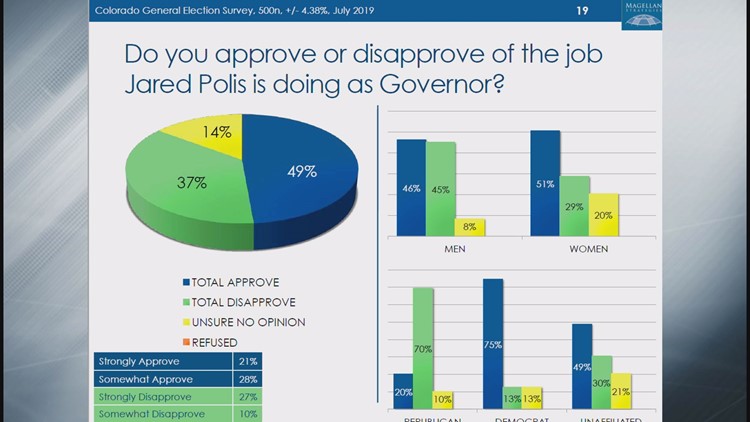- Polis and the Democratic legislature overreached in 2019
- Polis should not be recalled
- President Donald Trump would lose to an unnamed Democrat
- Congress should be controlled by Democrats
"Colorado voters are divided on the direction the state is heading. They do not approve of the job Donald Trump is doing as President, while a near majority approves of the job Governor Polis is doing. However, a plurality also agrees that Governor Polis and the state legislature overreached during this past legislative session and passed bills that went too far and were out of touch with everyday Coloradans. That being said, voters do not believe that Governor Polis should be recalled," wrote pollster David Flaherty.
Based on the 500 survey responses, 45% felt that Polis and the legislature overreached this past session, compared to 40% who did not think so.
Interestingly, 26% of Democrats surveyed felt that Polis and the legislature overreached, while 17% off Republicans did not.
In Polis' first year with a Democratically-controlled legislature, he signed into law:
- Colorado's involvement in the National Popular Vote, which would tie Colorado's nine electoral votes to the presidential candidate who receives the most votes nationwide. This would only take effect if states totaling 270 electoral college votes agree to the compact. There is currently an attempt to gather enough signatures to put this on the ballot for Colorado voters to decide.
- The 'red flag' law that allows a judge to order someone to have their weapons temporarily confiscated if they are deemed an extreme risk.
- Sweeping oil and gas reform that requires the state to make permit decisions by prioritizing public health, safety, welfare and the environment. Local jurisdictions can also enact stricter regulations.
"Dismiss Polis" is trying to collect 631,266 valid Colorado voters by Sept. 6 to put the recall question on the ballot. Should they be successful, Magellan found that 47% of Colorado voters would say no, compared to 38% who support a recall of Polis.
Unaffiliated voters are the largest bloc in Colorado, and 50% of unaffiliateds support not recalling Polis, compared to 32% who would recall him. Of the Republicans surveyed, 62% said yes compared to 24% saying no. The Democrats responded 66% no and 21% yes to a Polis recall.
The survey also showed Polis had a job approval rating of 49%, 12 points higher than those who felt he was not doing a good job.
"Right now, the numbers do not show any significant signs of weakness for the Governor," Flaherty wrote.
Voters were split on whether or not Colorado is moving in the right direction, with 44% saying yes and 41% saying no.
The poll, with a margin of error of +/- 4.4%, was conducted July 15 through July 17 and included 36% unaffiliated voters, 33% Democrats and 30% Republicans.
"Considering the significant growth of unaffiliated voters in the state, and the fact that they comprised 34% of turnout in the 2018 midterm, we are projecting that unaffiliated/other party voters will make up 37% of turnout in 2020. Democratic voters have been remarkably steady at 33% of turnout whether in midterm or presidential elections, and that is where we have them projected for next year. That leaves Republicans trailing at 30% of turnout," Flaherty wrote.
Based on the results, if President Trump wants to be reelected in 2020, he'll have to do so without Colorado's help. Colorado voted for Hillary Clinton in 2016, and would prefer an unnamed Democratic candidate to President Trump, 44% to 32%. When you isolate just the unaffiliated voters, 41% prefer an unnamed Democratic candidate compared to 24% who would pick President Trump and 21% who would choose a third candidate.
"Interestingly, women, younger voters and unaffiliated voters are also the most likely to choose some other candidate, which suggests that the ballot test could actually look worse for the president if those voters eventually choose between the two major-party candidates. Needless to say there is not a lot of good news here for President Trump’s prospects in Colorado," Flaherty wrote.
The survey also found that 57% disapprove of President Trump's job compared to 39% that approve. When you isolate the specific political parties, 21% of Republicans disapprove of the president's job, while only 7% of Democrats approve of his job. Looking at the unaffiliated voters, 58% disapprove, while 37% approve.
The poll also asked which party should be in control of Congress after the Nov. 2020 election. Democrats led with 47%, Republicans received 37% and 16% were undecided. Looking at only unaffiliated voters, 42% prefer Democratic control of Congress, compared to 24% that prefer Republican control, while one-in-three voters were undecided.
"Will enough voters be convinced of overreach to give Republicans a shot during next November’s elections, especially following next year’s legislative session? Just as important, how much will President Trump’s negative job approval affect down-ballot Republicans? Those are the two big questions to watch heading into 2020," Flaherty concluded.


No comments:
Post a Comment